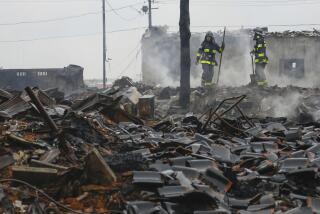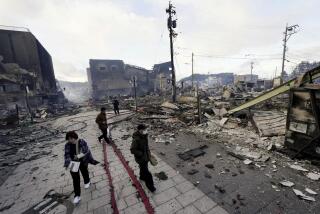Nikkei Jolted : Fallout From Kobe Quake Hits the Market
- Share via
KOBE, Japan — The tarnishing of Japan’s overseas image by massive earthquake destruction and the tardy government response to it spread to the markets Monday, triggering a selloff that drove Tokyo stock prices down in their heaviest one-day loss in 3 1/2 years.
The Nikkei index plunged 1,055 points, or 5.6%, to close at 17,785.49. The damage spread throughout other East Asian markets, which also posted sharp declines.
By midday today, the Nikkei had recovered about a fifth of Monday’s losses, climbing 230.42 points to 18,015.91.
Foreign analysts said fresh estimates of a $50-billion price tag for earthquake repair were higher than originally expected and that the Japanese government was moving too slowly to commit the large sums required for reconstruction. The estimates continued to climb.
Kosaku Inaba, head of the Japan Chamber of Commerce, estimated that the overall cost of the quake will amount to more than $100 billion.
“In addition to the direct damage, you have shipping problems,” he said in Tokyo. “Things aren’t delivered, schedules are out of whack. Vehicles can’t pass (on key highways). That means industries can’t ship their products, and those companies will suffer.”
About 30% of Japan’s trade goes through the heavily damaged port of Kobe, site of the heaviest damage. Major transportation arteries between eastern and western Japan have been cut by heavy damage to roads and railways. Major steel, auto and electronics factories in western Japan have temporarily closed down because of a lack of access to parts or because of earthquake damage.
Meanwhile, the tumbling Nikkei index raised currency concerns as the dollar rose to a two-week high against the yen.
“The drop in the Nikkei has people scared about the yen,” said Bob Gruber, senior currency salesman at Chemical Bank.
Despite investors’ reactions, Japanese analysts and strategists continued to say that the long-term impact of the quake on Japan’s economy will be limited and that its major disruptions are not likely to last more than a few months.
“You might see negatives to the economy over the next three months, but that should turn positive after that when the government begins investing in the region,” said Chisata Haganuma, a strategist for Nomura Research Institute.
Already, roads that were expected to take two years to rebuild are now expected to be completed in a quarter of the time. Goods headed for the Kobe port are being redirected and train lines are being repaired.
“The stock market is supposed to look long-term, and the impact of the earthquake is short-term,” said Akio Mikuni, head of a bond-rating agency.
He said the earthquake’s real impact on the stock market is the result not of economic pain, but damage to the credibility of the Japanese government.
For almost a year now, the Japanese stock market has been propped up by foreign buying. Foreigners bought Japanese stocks not because they provide good value--they are still twice as expensive as American stocks on a fundamental basis--but because they believed Japan’s commitment to propping up the stock exchange limited the downside risk.
The Japanese government has maintained a “price-keeping operation” that involves investing billions of dollars of government pension money into stocks to prop up prices.
Mikuni argues that the Japanese government lost credibility overseas because of its failure to stop downward-spiraling land prices, and now because of television footage of toppled highways and train lines--structures Japan has long boasted would survive worse earthquakes than the Kobe temblor.
While Japanese citizens have also lost some faith in the value of government assurances, Japanese investors have long since lost faith in the Finance Ministry’s ability to prop up stock prices.
“It’s hard to say Japanese stocks are attractive,” Haganuma says. But he says their lack of appeal results from slow profit growth tied to high costs and maturing markets, not to the earthquake.
Since Japanese investors have little interest in buying Japanese stocks at artificially propped-up prices, when the foreign sell orders came, there were few buyers and prices were quickly driven down.
* LATE RALLY: The Dow recovers from an early loss. D2
* BROAD PLUNGE: Asian markets follow Japan lower. D2
(BEGIN TEXT OF INFOBOX / INFOGRAPHIC)
Asian Stock Markets Tumble
In the wake of steep declines in Latin American stock markets since late December, investors now are fleeing Asian markets. Tokyo’s key stock index, the Nikkei, plummeted 5.6% on Monday amid worries about the fallout from the Kobe earthquake, while other Asian markets have been plunging for three weeks on fears of higher U.S. interest rates.
Tokyo’s Nikkei average, weekly closes since January, 1994, except latest:
Monday: 17,785.49
Key stock indexes, changes in native currencies:
Market 1994 1995 Seoul -18.6% -9.0% Tokyo +13.2% -9.8% Taipei +17.1% -11.6% Bangkok -19.2% -12.4% Kuala Lumpur -23.8% -12.5% Singapore -7.7% -14.4% Hong Kong -31.1% -14.9%
1995 data through Monday.
Source: Reuter
More to Read
Sign up for Essential California
The most important California stories and recommendations in your inbox every morning.
You may occasionally receive promotional content from the Los Angeles Times.













